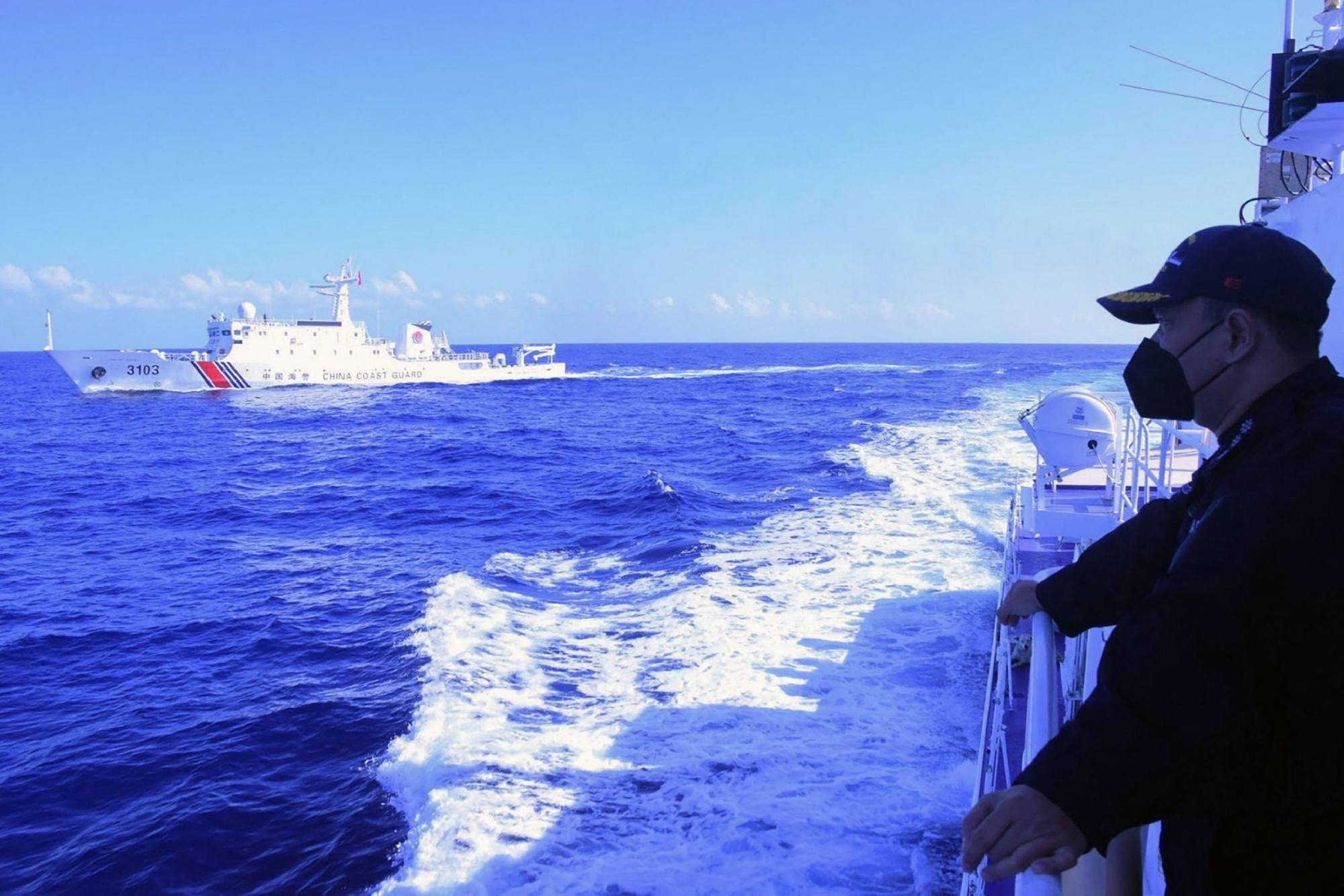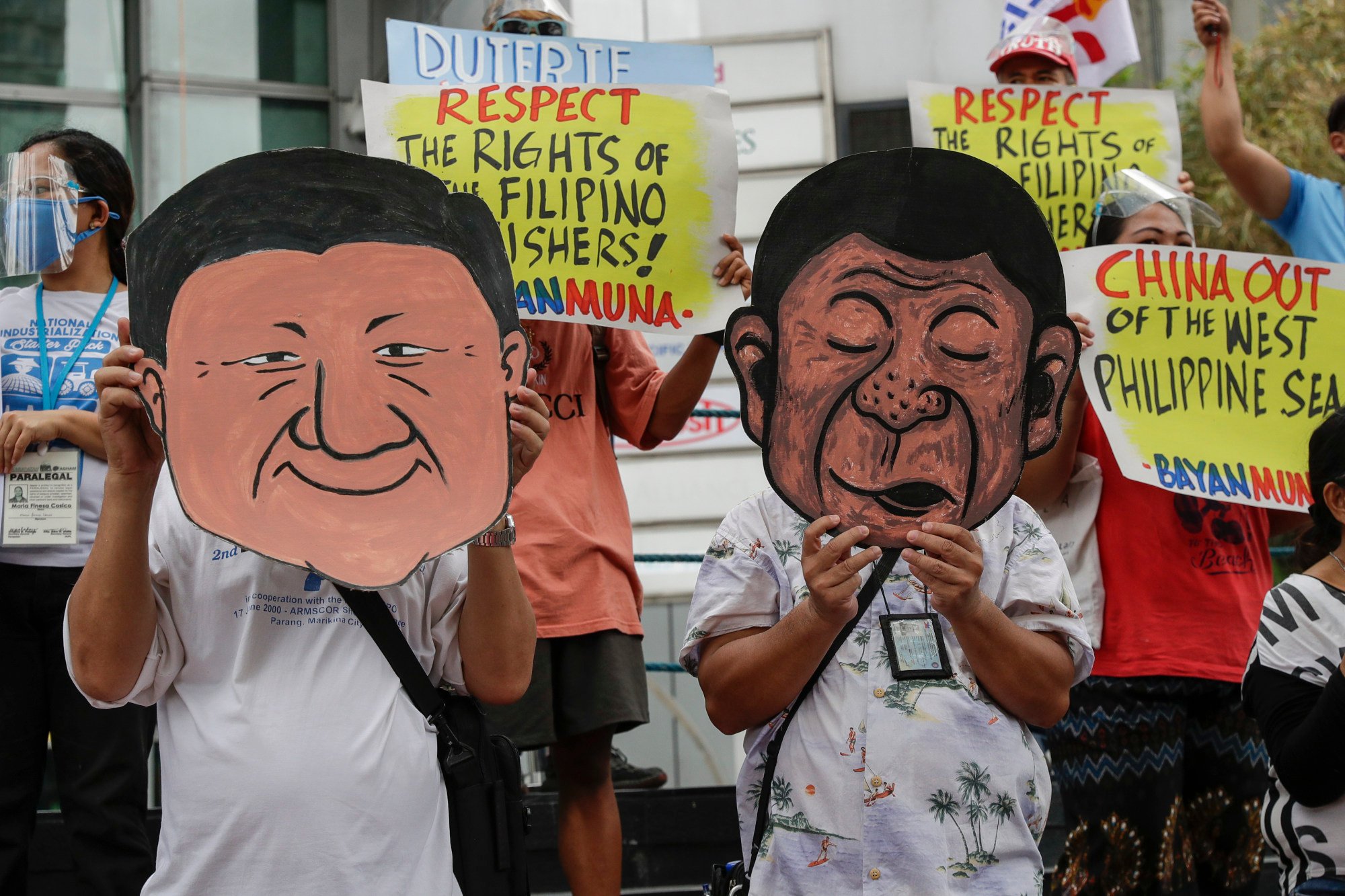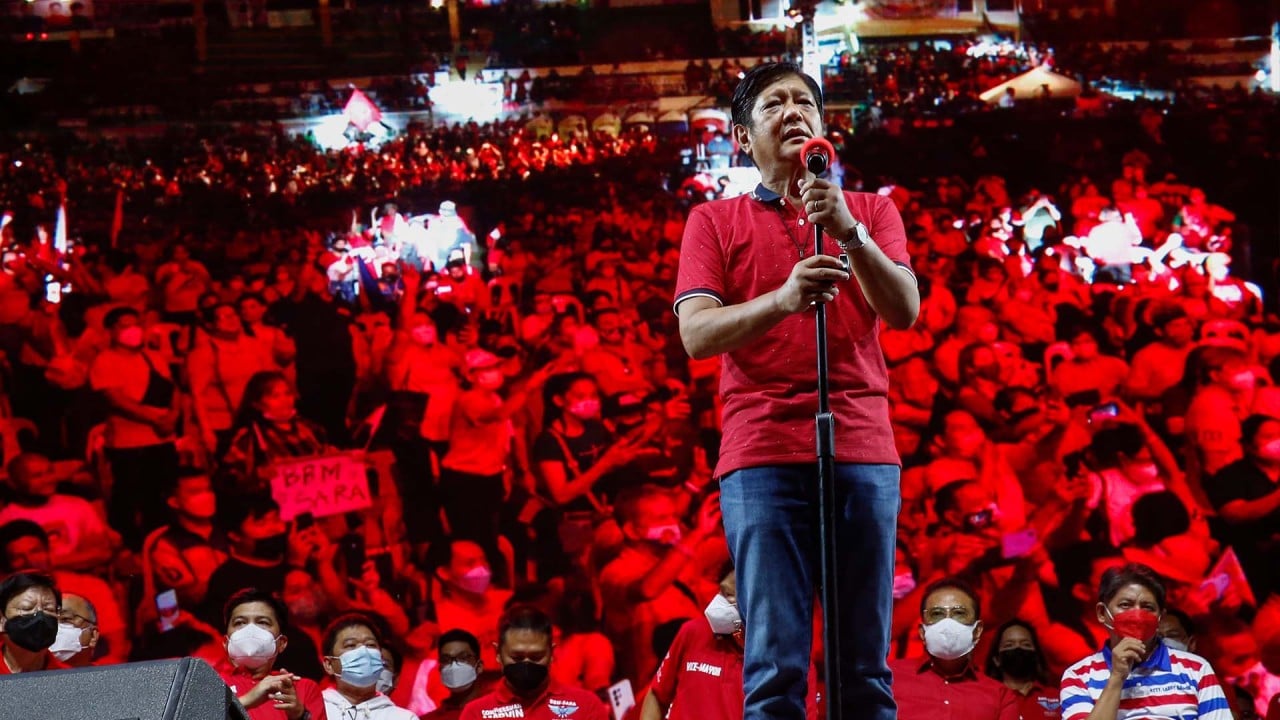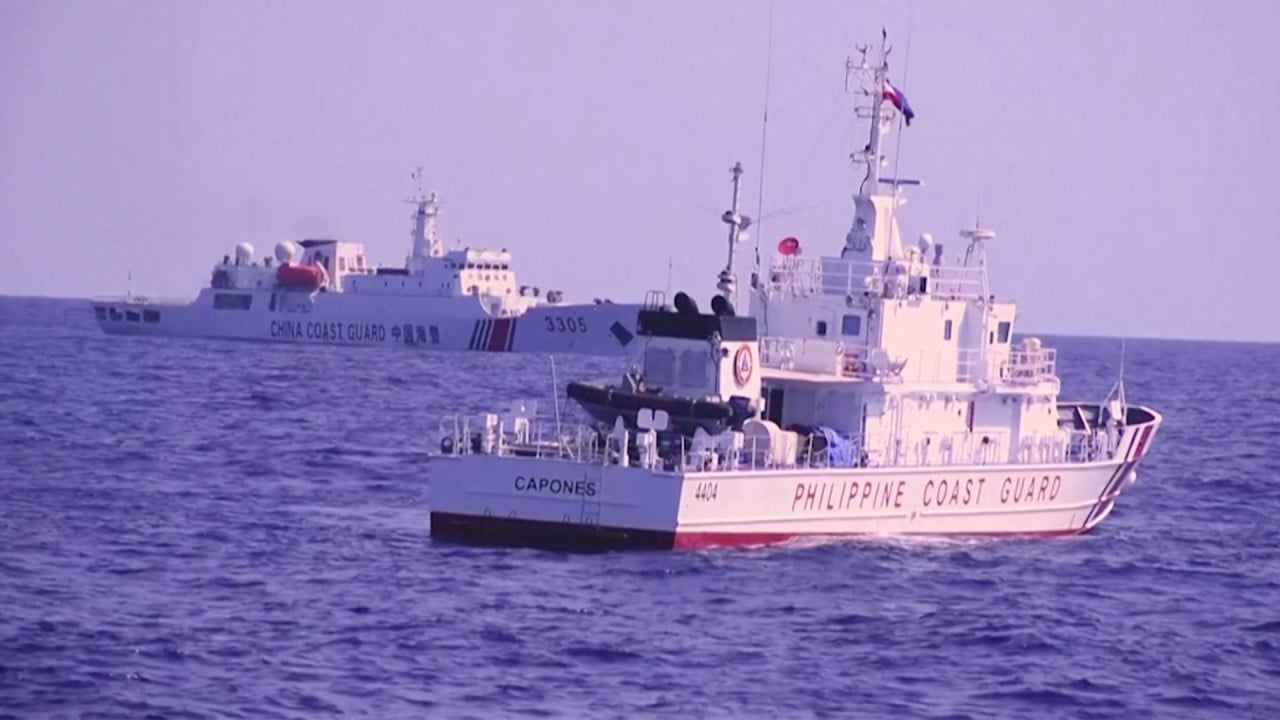
Philippine election: US or China? What Marcos and Robredo want for Manila’s foreign policy
- Bongbong Marcos has indicated he’s keen to adopt the Duterte administration’s dovish stance towards the South China Sea dispute, while Robredo has criticised Beijing’s ‘bullying’ behaviour
- A Robredo government would meanwhile champion international law and deepen ties with Washington, at a time the US is building up an Indo-Pacific framework with the Philippines and Asean at its core, observers note
Nonetheless, while Filipinos may not necessarily have an eye on international events as they vote on Monday, the incoming administration faces a raft of diplomatic challenges, not least China’s increasing activities in areas the Philippines deems to be part of its undisputed maritime territory.
The archipelago’s ultra-strategic location also means its affairs are closely watched by the world’s superpowers. The United States, a traditional ally, has been stepping up its engagement in the region, making the Philippines a potential flashpoint in any confrontation between Washington and Beijing.
Trolls and polls: fake news surrounds Philippines’ Robredo-Marcos showdown
Polls indicate that the race is down to two candidates: Ferdinand “Bongbong” Marcos Jnr, 64, and Vice-President Leni Robredo, 57.
The latest survey, published on May 2 by Pulse Asia, showed Marcos Jnr was leading by a wide margin, with 56 per cent of respondents saying they backed him as president, while 24 per cent supported Robredo. In 2016, Robredo beat Marcos Jnr in the race for the vice-presidency.
Whoever wins will need strong foreign-policy skills to deal with issues that could threaten the nation’s security.
South China Sea
The two candidates differ greatly in their respective diplomatic approaches towards China, analysts say. A Marcos Jnr administration would strike a friendly tone with China and lukewarm one with the US, while lawyer and former legislator Robredo would lead a government that is likely to strengthen ties with Washington and distance itself from Beijing.
Nowhere is this clearer than what both have said about the 2016 ruling by an international arbitral tribunal at The Hague, which rejected Beijing’s “nine-dash line” claims in the South China Sea, awarding the Philippines a landmark victory.
Philippines’ new leader must keep South China Sea agreement with Beijing: Duterte
Chong Ja Ian, an observer of China’s influence in Southeast Asia, said Marcos Jnr had appeared to stake out a position that was more eager about developing good relations with Beijing than his rival Robredo.
He noted that it was a similar situation for incumbent president Duterte, who had started his term with policies that sought to engage with China and to de-emphasise areas of friction.
Visiting Beijing after he took office in 2016, Duterte announced he was “separating” from traditional ally Washington. He later also said he would “set aside” the Hague ruling: “I will not impose anything on China.”
“However, complications with Chinese investments and continuing Chinese pressure on territorial disputes has led the Duterte administration to be more cautious about ties with Beijing,” said Chong, a political-science professor at the National University of Singapore.

Marcos Jnr has indicated he would continue the Duterte administration’s approach. In January, he said in a forum it was important for the Philippines to maintain harmonious ties with its larger neighbour.
“We know that the West Philippine Sea is a hotspot in geopolitics right now, that is why we still have to find our own line in terms of all these arrangements,” he said, using the Philippine name for its exclusive economic zones and maritime areas it claims in the South China Sea.
Marcos Jnr told the panellists he would work with “one simple principle: we will not cede one square inch of the Philippines to any country”.
Even so, he said he would make dealing with China a priority. “Amid all the many things that we have to fix, we should start with our alliance with China,” he said.
In a television interview elsewhere, Marcos Jnr suggested there was no point in supporting the tribunal win: “That arbitration is no longer an arbitration if there’s only one party. So it’s no longer available to us.”
Can Robredo’s ‘pink wave’ reverse the Marcos tide in Philippine poll?
Robredo’s position on the issue has been sharper. Under her administration, she has said, “step one” in diplomatic relations would be to gain “Beijing’s recognition of the arbitral ruling”.
“What’s ours is ours,” Robredo told a forum in January. “Our foreign policy will always put the interests of our people and our country first … we should be unrestrained by fear and be free from the influence of any political power.”
While she would be open to joint ventures with China, she said: “An agreement … must first be premised on China’s recognition of the arbitral ruling. For me a good neighbour and a real friend is really fair and follows international law.”
Diplomacy
Where friendship with China is concerned, Marcos Jnr perhaps has a distinct advantage: his name.
His father, the dictator Ferdinand Marcos, was the one who established diplomatic relations between Manila and Beijing in 1975.
The Marcos family has reportedly benefited from these ties. Writing in the Nikkei Asia, international analyst Alvin Camba noted how China in 2007 opened a consulate in Ilocos Norte, the Marcoses’ provincial home north of the country, and used it as a conduit for investment and commercial links.
“A Bongbong administration is likely to strengthen the capacity of the Marcos family to redirect Chinese commercial opportunities towards elites they favour,” wrote Camba, an assistant professor at the University of Denver’s Josef Korbel School of International Studies.
Last October, the Chinese embassy in Manila invited Marcos Jnr as a guest of honour to a ribbon-cutting ceremony for a photo exhibition that included a picture of his dictator father.
The embassy later issued a commemorative photo of the Chinese ambassador and Marcos Jnr seated under their countries’ flags, almost as if it were a state visit, although Marcos Jnr was a private citizen holding no public position at the time. The visit came just three weeks after Marcos Jnr had filed his candidacy for president.
But Marcos Jnr’s political nous is a far cry from his father’s, who practised a shrewd Cold War diplomacy that not only opened relations with communist countries, but also convinced the US to support his regime for 14 years.
China has no ‘preferred candidate, will work with next Philippine leader’
Apart from domestic events and China, Marcos Jnr has not indicated any major position on matters beyond the Philippines’ shores.
A few months ago, one academic, who declined to be named, told This Week in Asia that the Marcos campaign was still working on a foreign policy package. It still had not been presented as of Friday.
About a week after Russia’s invasion of Ukraine, Marcos Jnr said there was no reason to weigh in on the crisis. “I don’t think there is a need to take a stand,” he said, adding the only pertinent issue for him was the safety of Filipinos in Ukraine.
But three days later, amid growing global outrage and the rise in local fuel and food prices brought on by the war, Marcos Jnr walked back his position, saying in a statement that Russia should “respect Ukraine’s freedom and its citizens’ democratic way of life”.

Robredo on the other hand said Manila had “a moral imperative to stand against bullying and unprovoked aggression”. She had last used the word “bully” to describe incursions into Philippine waters.
On the fifth anniversary of the Hague tribunal ruling last year, Robredo had called out the Duterte administration for failing “to fully flex the ruling as an instrument to pursue our national interests”.
Without naming any countries, but in a clear reference to Philippine-US ties, she criticised how “alliances that could have been strengthened were allowed to erode, while those who bully their way into our waters have been treated with deference, and at times, subservience”.
According to Robredo, “the dream of a regional architecture founded on respect and mutual prosperity has become even more elusive”.

Duterte’s legacy
Whether the Philippines will mend and deepen ties with the US or continue the Duterte administration’s rollback of ties remains an issue keenly watched by observers.
The president cancelled joint patrols between Philippine and American forces and scaled back the Philippines’ participation in military exercises with the US. In 2020, he said he was terminating the Visiting Forces Agreement, a key military pact with the US.
Duterte also hinted he might scupper the Mutual Defence Treaty (MDT), a 71-year-old agreement that is the cornerstone of Philippine-US security relations. The treaty obligates the two signatories to come to each other’s assistance if either is attacked.
Last year, US Secretary of State Antony Blinken emphasised the MDT’s “clear application to armed attacks against the Philippine armed forces, public vessels or aircraft in the Pacific, which includes the South China Sea”.
Wang Yiwei, director of the institute of international affairs at the Renmin University of China, said what was of particular interest was whether the Philippines would become a more active part of the US’ Indo-Pacific Strategy, especially in the area of security.
“This will have an impact not just on the South China Sea issue, but also on China’s relations with the Philippines,” Wang said, noting that under the strategy, the US had already made the Philippines and Asean its focus.
No, Robredo isn’t allied with communists: ex-Philippine military spokesman
Released by Washington in February, provisions in the plan appear aimed at countering China’s economic clout, military power and its signature Belt and Road Initiative.
The Philippines’ further participation in the strategy might strain ties with China, Wang said, adding that whether Manila placed emphasis on its role within Asean, ties with China, or under the Indo-Pacific framework would be closely watched.
“From the perspective of the Philippines’ development, whether in terms of its domestic economy, infrastructure development, or even peace and security, maintaining a relatively good relationship with China is beneficial to its security and continued development,” Wang noted.
In January, when asked in a forum if the Philippines should join the Quad – the Quadrilateral Security Dialogue grouping composed of the US, India, Japan and Australia, viewed as a counter to China – Marcos Jnr said: “I think any of these agreements, we should of course encourage, as long as it is very clear to us what is the advantage to the Philippines.”
But he added he did not believe in the idea of “great powers” having “spheres of influence”.
What challenges will next Philippine leader face in militant hotbed of Mindanao?
In his recently published book, The Making of the Modern Philippines, journalist and historian Philip Bowring described “the eagerness with which Duterte and his followers looked to China for the boost to economic growth that they themselves could not provide because of corruption and bad management”.
According to Bowring, “Duterte’s and his successive secretaries were less attuned either to the language of international affairs, or to putting strategy above local politics”. He noted how the administration “failed to develop an alternative foreign policy which would use the influence of regional middle powers to balance China”.
When Duterte steps down in July, his foreign policy legacy will resemble a deflated ball. Possibly because of pressure from the military and Foreign Affairs Secretary Teodoro Locsin Jnr, he has walked back his anti-US positions – after postponing the termination of the VFA, he ended up renewing it in 2021, while military exercises with the US have resumed.
Chong, the Southeast Asia observer, said a Marcos Jnr victory would likely mean a continuation of what was observed during the Duterte era “in some respects”.
But the bigger question would be how Manila responded in the event that China’s actions caused more friction with Southeast Asian countries or if US-China differences further intensified.
“Everyone would love to have their cake and eat it, too,” he said. “Whether circumstances beyond their control allow them to get what they want is another matter altogether.”
Additional reporting by Maria Siow and Dewey Sim



